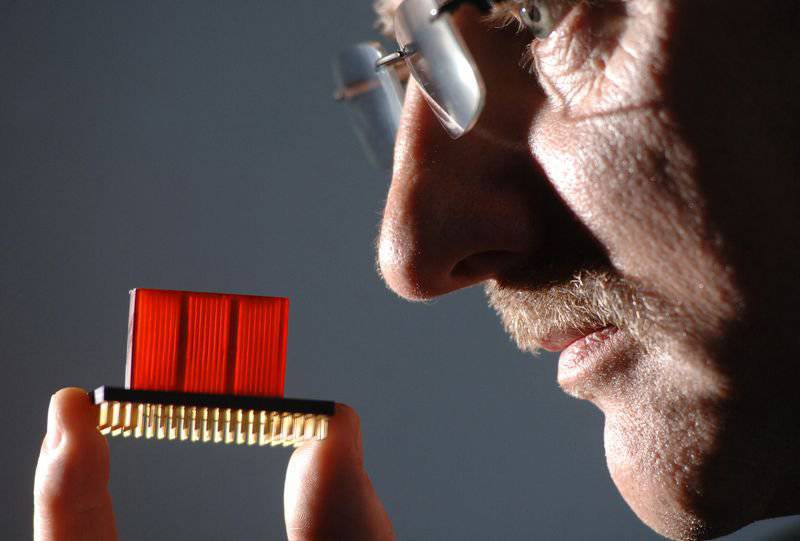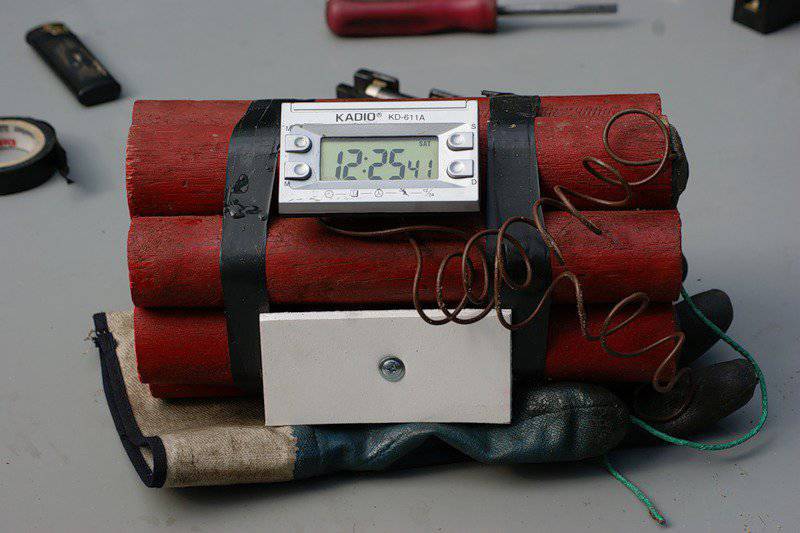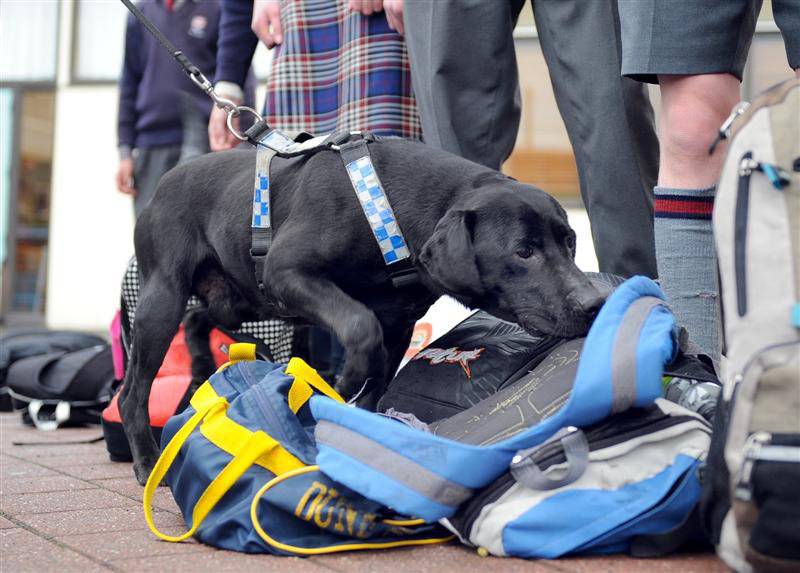In Israel, created an electronic nose for the recognition of explosives
It is reported that nanotransistors are placed on the Israeli novelty chip, which are able to change the conductivity upon contact with them of only one explosive molecule. Based on the smallest changes in the electrical conductivity of the installed nanotransistors, the mathematical algorithm developed by the scientists analyzes the substance interacting with the nanotransistors. According to the estimates of Israeli scientists, the device presented by them in the case of its serial production will be cheaper than the current systems for searching for explosives.
At the same time, exact information about the sensitivity of the created chip is not given, but it is said that it is able to work at a concentration of even several molecules of explosive per quadrillion molecules belonging to other gases. The search for explosives is carried out in real time. According to the assurances of Israeli engineers, the electronic chip is able to successfully differentiate explosives from other substances, which can produce a positive result when conducting other tests.
In addition, sensors mounted on the chip are also able to find improvised explosive devices in which non-traditional explosives can be used. It is reported that the "electronic nose" is able to determine the hexamethylene triperoxide diamine or acetone peroxide, substances that are quite often found in improvised explosive devices. In this case, the Israeli chip, unlike many other systems for searching for explosives, can determine the type of explosives with very high accuracy. It is reported that the device from Tel Aviv can also work with liquids.

Such studies are conducted today not only in Israel, but also in the United States and Russia. So in October last year, American engineers from Vanderbilt University in Tennessee made a statement about the creation of a new technology, aimed at finding explosives of both high and low power. In the method developed by American scientists, a phased acoustic emitter is used, which allows you to send an ultrasonic beam to the object under test.
At the same time, a laser beam is also aimed at the object being checked, which allows one to accurately measure the frequency of oscillations of its shell under the influence of an ultrasound object. In terms of the frequency and strength of the resulting oscillations, it is possible to install explosives with a fairly high degree of probability. The truth so far this method works only in cases with explosives that are placed in a plastic container. In this case, the developers say that in the future, the capabilities of the device will be expanded to a tissue membrane.
"Electronic nose" in Russia
Work on the creation of an "electronic nose" is underway in Russia. Back in March 2013, Rossiyskaya Gazeta wrote that in our country an electronic nose was made at one of the enterprises. At the same time, this device had the most serious tasks - to capture molecules and atoms of a substance in the air in order to then determine the presence of hazardous components and various explosives.
This highly delicate work requires the use of a rather non-standard element base. Such a base was developed specifically for Russia by Belarusian colleagues representing Planar. This is currently the only enterprise in the post-Soviet space where the complex carries out the process of developing and producing equipment necessary for the production of microelectronic products. At the same time, this enterprise has merged with its Russian colleagues in the framework of the Microsystems Engineering program being implemented in the Union State.

According to Gennady Kovalchuk, General Director of Planar, one of the main tasks of this scientific and technical program is the creation of various sensors and sensors that can be used in various spheres of our life. For example, they can be used to warn us about all critical changes in oil and gas pipelines, building structures, large mechanisms and machines. Such knowledge would prevent many disasters.
If you go back to the "electronic nose", then its main purpose is to work with prohibited chemistry. Prohibited chemistry is called explosives, drugs, various toxic substances. At the same time, the number of elements included in this unwritten table increases every year and evolves. The composition of the components used is changing, new production methods are emerging. Therefore, it becomes more and more difficult to recognize such substances with traditional means every year.
Today, a huge amount of budget funds are spent on upgrading the control systems of airports, customs and border services, strategic facilities, and a large amount of new equipment is being acquired. Although in the ideal case only one, but a universal device that could recognize the most diverse substances would be needed, quickly learning and self-improving, would be simple and compact. It seems that Russian engineers can offer industry just such a device.
We are talking about a device called "electronic nose", which works on the basis of ion mobility spectrometry. According to Nikolai Samotaev, a senior lecturer in the department of micro- and nanoelectronics at the National Nuclear Research University, this is a fairly compact portable device that can detect thousands of existing types of explosives.

The question arises, why do you need to invent such complex devices, if a person has a free analogue, which was created by nature itself. We are talking about dogs, which, in fact, are the same gas analyzer because of a very developed sense of smell. The nose of the dog contains about 200 million olfactory cells, which allows this animal to find in the air even a few molecules of the desired element. But even such a unique natural complex is not an ideal bloodhound.
Nikolai Samoteev notes that when training an animal, it is given an explosive sniff, encouraging the dog to do something tasty. If the dog remembers that a tasty gift is waiting for her to find the explosives, she will be engaged in her search for her whole life. It is difficult psychologically for an animal to reconstruct from this mission. It is quite another matter of modern devices. The “electronic nose” device is designed in such a way that once you bring this or that substance to the device and pressing the “remember” button, you are guaranteed to leave in its memory all the necessary information that will be stored in the device during its entire operation.
The very principle on which a small device with a thin plastic proboscis will work was introduced as early as 1960. This technology was mainly used in the army in the units of biological and chemical protection. Today, thanks to the very rapid development of microelectronics, such a device no longer occupies a third of the truck. Modern devices do not just weigh no more than 3-kilograms, they have become incredibly sensitive. The existing devices can easily show the presence in the air of nitroglycerin, RDX, nitrotoluene, С4 explosives and one of the most common explosives in Russia - hexogen.

In this case, devices can find not only explosives, but also drugs even in the most microscopic doses. If necessary, devices can also recognize people, because a person also has his own smell, and this is not the smell of his perfume, but the smell of lactic acid. It is on this smell that dogs are trained, which are used by Emergency Situations Ministry officers in search and rescue operations. If a person is buried under the rubble in a tightly enclosed space, his smell gradually accumulates in this space. This smell will surely seep through the rubble. This is another field of activity for the "electronic nose". If a sample taken from a cleft in the rubble contains lactic acid, then a person should be sought under the rubble.
At the same time, in our country the device was not created at all for search operations. This is a peculiar side effect of its creation. The initial task of the device is to protect the strategic facilities of Rosatom. It is for this reason that the National Nuclear Research University worked on the device.
Information sources:
http://lenta.ru/news/2014/07/25/nose
http://www.vesti.ru/doc.html?id=1164303
http://www.rg.ru/2013/03/14/kibernos.html
Information